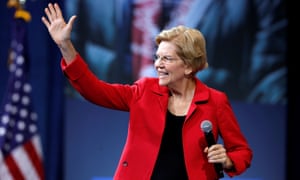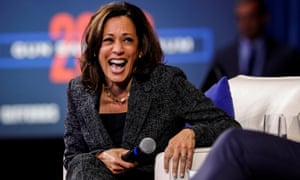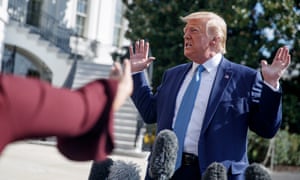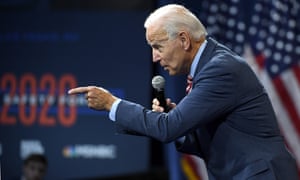Impeachment has changed things but 2020 contenders from Joe Biden down must balance attacks with positive messaging
Hours after Donald Trump
unleashed a snarling, conspiracy fueled attack on Joe Biden, calling
him “stone-cold crooked” in one of the angriest public performances of
his presidency, the former vice-president and frontrunner for the 2020
Democratic presidential nomination fired back.
On a stage adorned with American flags, in a carefully measured
voice, Biden delivered his most forceful response yet to what he called
Trump’s campaign of “lies, smears, distortions and name calling”, meant
to drive him out of the presidential race.“Let me make something clear to Trump and his hatchet men and the special interests funding his attacks against me: I’m not going anywhere,” Biden said at the student center at Truckee Meadows Community College in Reno, Nevada. “You’re not going to destroy me. And you’re not going to destroy my family.”
Earlier that day, he told moderators at a forum on gun safety in Las Vegas that he preferred to concentrate on the issues that matter to voters – like healthcare, the economy and gun control.
Nonetheless, the rapidly escalating impeachment inquiry has upended the best laid plans of the candidates who hope to replace Trump and pushed the Democratic primary into uncharted territory. Now the presidential hopefuls are under pressure to respond to Trump’s mushrooming scandals without neglecting their own positive message.
At a fundraiser in Palo Alto on Thursday, Biden acknowledged the difficulty of striking a balance between advancing his policy agenda and condemning the behavior of a norm-shattering president who rarely pays a political price for his actions. It’s a familiar conundrum, he said, one Hillary Clinton faced in 2016.
“What happened was – and she talks about it – you got sucked into the trap of the stuff that Trump was saying,” he told donors. “He wants you in a mud fight.”
Nancy Pelosi, the House speaker, had for months resisted calls to announce an impeachment inquiry, not least because of the political risks before an election year. But the events of the past two weeks have opened a remarkable new chapter.

“Impeachment completely alters the playing field,” said Jared Leopold, a Democratic strategist and a former campaign aide for Washington governor, Jay Inslee, who left the presidential primary race in August. “It will test who can adapt to the playing field.”
Already the furor in Washington has dominated cable news and social media, forcing candidates to adjust their messaging. The Democratic presidential primary debate in Ohio on 15 October will only heighten the drama, as 12 candidates compete on one stage for speaking time and attention.
There are competing theories about which Democrats stand to benefit from an impeachment inquiry. But there is a general consensus that Biden and his leading rival, the Massachusetts senator Elizabeth Warren, are established enough to command or at least interrupt a news cycle that turns on every revelation, hearing and document dump.
Candidates already struggling to break through are at a disadvantage.
“Whatever drives the cable news cycle is going to drive the presidential cycle,” Leopold said. “It’s going to be tough to break through with new policy proposals at a time when impeachment sucks up all the oxygen.”
Complicating matters is that Trump not only survives scandals but thrives on them. When under attack, Trump’s modus operandi, as defined by his wife, Melania Trump, is to “punch back 10 times harder”.
As Trump’s fury builds, so does public support for impeachment, according to a spate of polls conducted after Democrats opened a formal inquiry. This surge is due in large part to Democrats, who are following their leaders. It also shows the possibility and peril for all 19 candidates for the nomination.
But polling suggests the impeachment inquiry has not affected the dynamics of the Democratic primary – at least not yet. Biden maintains a narrow lead, with Warren ascendant, trailed by the Vermont senator Bernie Sanders with the rest of the field in the single digits.
Warren was among the first to advocate impeachment proceedings after the release of the Mueller report into Russian election interference, which did not exonerate Trump. It was a risky move at the time that many believe was the beginning of her rise.
As she gains ground, rivals have started to sharpen their criticism of her policy platform. But the impeachment inquiry may overshadow such efforts.
Despite being at the center of the controversy, Biden has taken a more cautious approach than some of his rivals: he supports impeachment only if Trump stonewalls the House investigation.

Trump’s impeachment is a “double-edged sword” for the former vice-president, Leopold said.
Yet the scandal also brings fresh scrutiny of his son’s foreign business dealings while his father was vice-president, even though allegations advanced by Trump and Republicans are unfounded.
So far, Biden’s rivals have refused to use the inquiry against him, mindful of propagating unsubstantiated Republican attacks.
The California senator Kamala Harris, who launched a deeply personal attack against Biden over his record on race in the first debate, said he had “more patriotism in his pinky finger” than the current president. Senator Cory Booker, another rival who has been critical, urged Iowa TV stations to stop airing a Trump ad falsely attacking Biden.
Presidential contender Pete Buttigieg, asked recently if he would allow his vice-president’s children to serve on a foreign company’s board, he refused to answer: “Playing that game is playing the president’s game. And the moment you’re playing it, even when you’re winning, you’re losing.”
With less than four months before voting begins in Iowa, candidates running to unseat Trump must defend a process that could result in his removal before then. And while the field uniformly supports the House’s impeachment inquiry, few believe Trump will actually be removed from office by the Republican-controlled Senate.
“It’s awkward,” said Elaine Kamarck, who worked in the Clinton administration and is a senior fellow at the Brookings Institution. “That’s why they need to concentrate on their own positive message. They need to give people something to vote for – not just someone to vote against.”
Some Democrats believe candidates should seize the moment and attack Trump more aggressively still.
“It’d be a missed opportunity not to seize this moment, especially among black voters who have been calling for this,” said Cliff Albright, the co-founder of Black Voters Matter. “There is nothing to lose by going hard after him right now. There’s blood in the water. He’s vulnerable. And that’s what the base wants to hear.”
The smart strategy, Albright says, is to connect Trump’s conduct with policy concerns, for example by drawing parallels between his calls for foreign countries to help investigate a political rival and voter suppression efforts.

Trump is trying hard to set the rules of engagement. He has labeled his opponents “Do-nothing Democrats” and tweeted that they are too absorbed by impeachment to follow through on legislative priorities, including gun safety.
At the gun safety forum in Las Vegas this week, the Democratic candidates scoffed, insisting any hope of legislative compromise is a mirage as long as the Senate majority leader, Mitch McConnell, presides over a “legislative graveyard”.
“This is like an alternate reality,” Warren said. “What’s so disturbing is that a tweet like that makes it clear that Donald Trump understands what the American people want to see done.”
Harris said Trump was using impeachment “as an excuse” for why he “has gotten close to nothing done”.
From Capitol Hill to the campaign trail, Democrats have adopted a “walk and chew gum at the same time” mantra. They insist the impeachment inquiry will not stop them from talking about lowering the healthcare costs, addressing income inequality and combatting climate change.
“They’ve got to keep chopping wood,” said Brad Woodhouse, the executive director of Protect Our Care.
How to expand healthcare has emerged as one of the distinguishing issues among the Democratic hopefuls and consistently ranks as the top priority for the public.
“They must prioritize healthcare,” Woodhouse said. “And they must go on the offensive. Democrats have spent a lot of time talking about the differences they have over coverage. But they haven’t spent nearly enough time talking about what Donald Trump is doing to dismantle the American healthcare system.”
Several strategists described impeachment as a disruptive force with potentially perilous electoral consequences. But Jess McIntosh, a Democratic strategist who worked on Clinton’s 2016 presidential campaign, sees opportunity.
“Impeachment is the opposite of a monkey wrench,” she said. “It gives our field a really clear opportunity to offer a vision of a post-Trump America. And I think that is what Democratic voters really want to hear from our candidates because, regardless of how this ends, we’re going to need a really big repair job.”

No comments:
Post a Comment